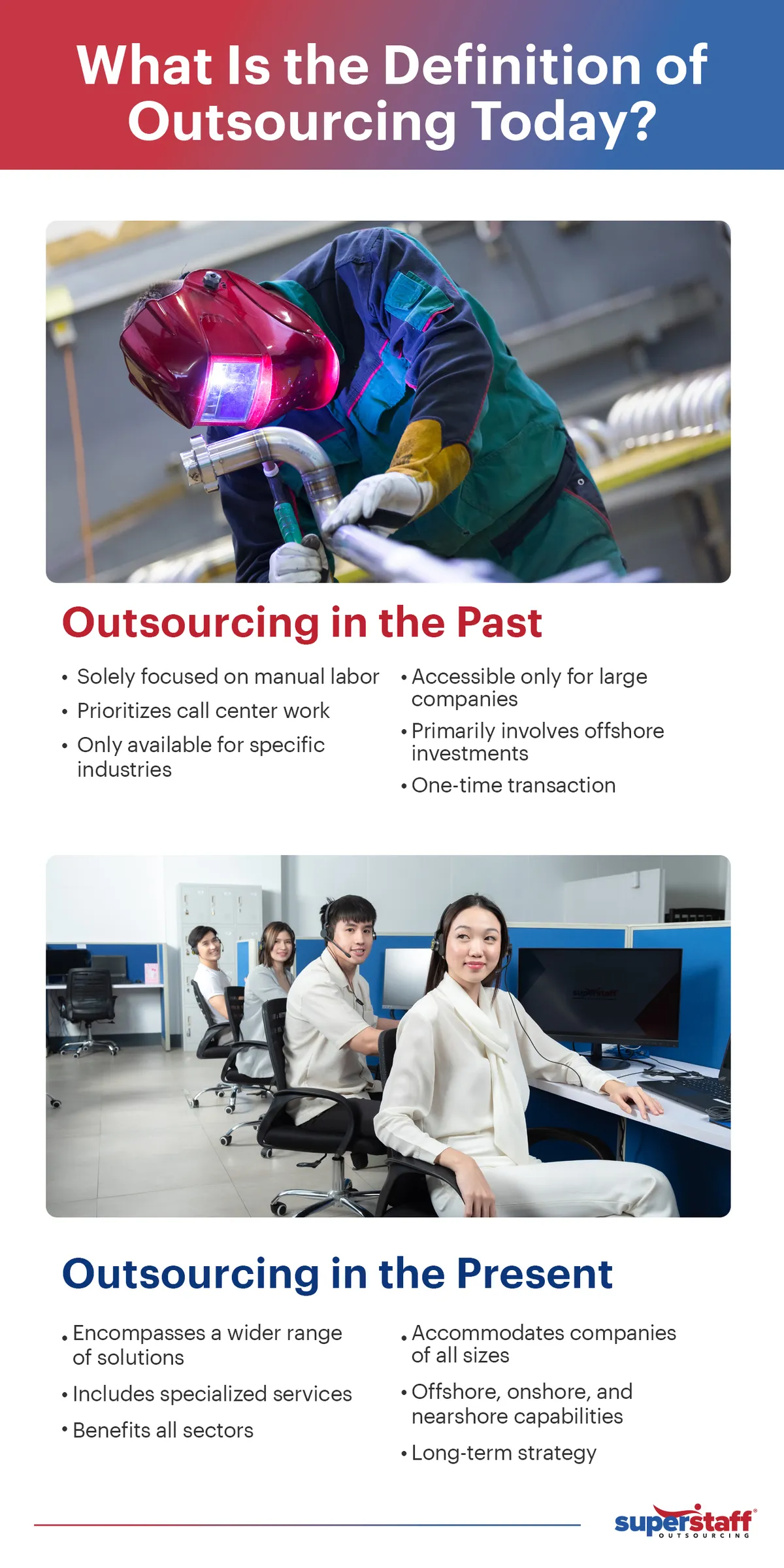
Outsourcing has interconnected the business sector, enabling companies with different core competencies to work together and fill the gaps in each other’s operations. However, not many people know how widespread outsourcing has become in modern times and still doubt the advantages of working with a BPO provider.
The reason is that many of these people have heard misconceptions and myths about outsourcing that may have been somewhat true in the past but are no longer relevant today. Let’s untangle these misconceptions one by one to discuss the outsourcing definition that’s genuinely relevant in 2024.
Past vs. Present: What Is the Outsourcing Definition Today?
The dictionary definition of outsourcing goes as follows:
Business process outsourcing (BPO) refers to delegating specific business functions or tasks to an external provider. By leveraging the expertise of these BPO firms, companies can increase efficiency and improve performance quality while reducing costs.
When many think of outsourcing, the first thoughts that come to mind are call centers or factory work. But today, outsourcing is so much more than that.
PAST: Outsourcing Is Focused on Manual Labor
The 18th-century Industrial Revolution drove Western companies first to realize the value of outsourcing. Previously, U.S. factories were limited by geography, but the new age changed how manufacturers sourced labor and raw materials.
The American industrial sector would outsource and import raw materials from faraway countries like India and China to reduce material and labor costs while maintaining product quality. They would also establish factories there, dipping into a larger pool of blue-collar workers.
Since then, the BPO industry has evolved to meet the changing demands of modern times. Today’s outsourcing sector is no longer limited to manufacturing jobs and other blue-collar labor but encompasses various industries and solutions.
PRESENT: Outsourcing Encompasses a Wide Range of Solutions
Many U.S. companies still offload factory work to offshore providers today. However, outsourcing is no longer primarily connected with manual labor. Today, in 2024, you can outsource various services beyond blue-collar work.
For example, manufacturers can outsource logistics support, supply chain management, data analysis, or other specialized services even within the same industry. Today, outsourcing has become more associated with “white-collar work,” including financial services, IT jobs, and call center solutions.
PAST: Outsourcing Prioritizes Call Center Work
The business process outsourcing sector pivoted away from manual labor in the late 1980s to 1990s, evolving into the industry we’re most familiar with today.
After the two world wars ended, free-market economies boomed, and entrepreneurs rose to the occasion. With growing economic prosperity, consumers were blessed with a higher spending power and empowered with more options than ever before.
At the same time, the rise in sales transactions led to a significant demand for customer service – and this is where the BPO industry stepped in.
Contact centers were established to address the skyrocketing need for customer support as businesses struggled to manage overwhelming call volumes. Beyond handling customer complaints and inquiries, call centers offered outbound services, such as telemarketing and telesales.
PRESENT: Outsourcing Includes Specialized and Niche Services
Today, “BPO” is almost synonymous with customer support, telemarketing, telesales, and other call center work. However, the rise of digital technologies has radically transformed the industry’s capabilities.
In the past, customer service was limited to phone calls and the occasional email. Today, omnichannel support, which can address customer feedback through multiple platforms, has become essential to business success. BPOs have since risen to the challenge, providing 24/7 customer service over the phone and through email, live chat, and social media.
With increasing globalization also came the need for multilingual call center solutions. Businesses operating internationally and within the United States can no longer assume that all their customers speak the same language and must provide options to allow them to share their concerns in their native tongue.
Beyond call center work, today’s BPO companies handle back-office functions, such as accounting and bookkeeping, payroll, and recruitment. At the same time, you can hire knowledge process outsourcing providers who take on specialized tasks such as software development, AI development, data science, and more.
PAST: Outsourcing Is Only Available for A Few Industries
Here’s another misconception about outsourcing: Many people think that BPO solutions only benefit industries like manufacturing or customer service. This may have been true when technology was not yet as advanced, but today, companies can work directly with outsourced teams for various sectors.
PRESENT: Outsourcing Is Beneficial for All Industries
Over the past few years, outsourcing has expanded in scope to include various industry-specific services. Today, BPO solutions can be customized to the particular nature of your business and industry. Here are just a few examples of sectors that benefit from outsourced services:
Legal Sector
Law firms can opt for legal process outsourcing to lighten the workload of their in-house attorneys. LPO professionals can handle legal research, document review, and other paralegal services, allowing firms to access specialized expertise and address fluctuations in client demand without needing to hire full-time staff.
Tech Industry
Digital transformation is crucial for retaining your competitive edge in today’s cutthroat business environment. As such, outsourcing tech jobs, such as information technology (IT), computer programming, and technical support, has emerged as a strategic solution to help companies accelerate digitalization initiatives without significantly disrupting their existing processes.
Healthcare
From widespread healthcare worker shortages to the demand for better patient care, the medical industry has undergone a significant evolution in the post-COVID landscape. Through specialty healthcare outsourcing, medical providers can tackle these challenges head-on, helping reduce the workload of their in-house staff while elevating patient experience.
Human Resources
The nationwide labor shortage is one of the biggest challenges U.S. businesses face today. Thankfully, companies can strengthen their competitive edge in the historically tight labor market by outsourcing recruitment services. BPO providers can connect them with qualified candidates from across the globe while also improving employee retention by handling crucial HR functions like payroll and employee engagement.
PAST: Outsourcing Is Accessible Only for Large Enterprises
Another widespread myth about outsourcing is that only well-established and large companies can leverage it to their advantage. It may have been true in the past when only the big players, which have more complex operations spanning multiple departments, saw the value of working with an external vendor with specialized expertise.
Studies have found that companies with over 50 employees (66%) are more likely to outsource than those with fewer workers (29%), suggesting that business size influences the demand for BPO solutions.
However, more small and medium-sized enterprises (SMEs) today are realizing the advantages of partnering with a BPO provider. Startups, in particular, leverage outsourcing solutions to enhance scalability and flexibility, which are crucial for business growth.
PRESENT: Outsourcing Is Accessible to Companies of All Sizes
Here’s the indisputable truth: the BPO industry does not discriminate based on company size. Whether running a growing startup or a Forbes 500 enterprise, you can reap the many rewards and advantages of outsourcing.
Large enterprises utilize outsourcing services for increased efficiency and productivity in their existing operations, while smaller companies may hire a BPO to cut costs while expanding their capabilities. While their reasons for outsourcing may differ, businesses of all sizes can easily access and benefit from a BPO company’s value-added solutions.
Here are a few statistics illustrating the growing demand for outsourcing among small and medium companies:
- 37% of small businesses outsource a portion of their business operations.
- 52% plan on adopting BPO services in the future.
- Small businesses choose outsourcing as a way to enhance efficiency (24%), gain access to specialized expertise (18%), improve flexibility (16%), and enable in-house employees to focus on core activities (15%).
- 83% of small businesses planned to maintain or increase their outsourcing investments in 2023.
- Despite concerns about a potential recession, 62% aim to use outsourcing to build their teams and grow their revenues.
PAST: Outsourcing Means Investing in Faraway Countries
Another misconception about outsourcing is that businesses must always delegate tasks to faraway countries. Many mistakenly believe that “outsourcing” and “offshoring” are synonymous, but the truth is that they are vastly different terms.
Offshoring means delegating business functions to countries that are geographically far from your home country, while outsourcing is not particularly location-specific. Companies can outsource tasks to a BPO provider in a different city, state, region, country, or continent, depending on their needs.
The confusion stems from the fact that Western economies depended solely on offshore providers, particularly from countries like China and India. However, multiple geopolitical tensions, supply chain disruptions, and other international trade problems have highlighted the advantages of keeping operations closer to home, thus fueling the rise of onshore and nearshore outsourcing.
PRESENT: Outsourcing Location Is Dependent on Your Strategy
The BPO destination you choose should depend on your specific needs and goals. Before selecting a location, it’s wise to identify which solutions you need to maximize your investment and which outsourcing model best complements your business strategy.
Offshoring
As mentioned above, offshoring refers to outsourcing to a faraway country. The main advantage of this outsourcing solution is cost reduction, enabling businesses to minimize expenses due to the country’s lower living and labor costs. Offshoring can also benefit industries that can afford to be more hands-off with their outsourced team.
For example, U.S.-based e-commerce companies can hire a call center in the Philippines to handle omnichannel customer service, allowing 24/7 support beyond regular American office hours.
Onshoring
Onshoring, which means outsourcing to BPO companies within your home country, is becoming an increasingly popular alternative to the more traditional offshoring. It allows companies to offload support tasks to providers in cities or states with lower living costs while retaining more control over their outsourced operations.
For example, a New York-based law firm can outsource paralegal services to a BPO in Pennsylvania. The minimal time zone differences allow the two companies to more easily communicate and collaborate during the entire course of their partnership.
Nearshoring
Nearshoring provides a practical compromise between the cost benefits of offshoring and the geographical proximity advantages of onshoring. This outsourcing solution involves hiring a BPO provider in a nearby country, usually one with a similar time zone.
An example is when a U.S. tech company partners with an IT and software development team from Colombia. This way, the business can address nationwide tech worker shortages by tapping into a much wider talent pool while leveraging the time zone alignment to ensure seamless project communication.
Hybrid Strategy
To improve flexibility and resilience, you can choose a hybrid outsourcing strategy that blends onshore, offshore, and nearshore capabilities. The goal is to work closely with your BPO provider so they can develop the operational strategy that works best for your business.
PAST: Outsourcing Is a One-Time Transaction
Finally, another long-standing misconception about outsourcing is that it is only a one-time transaction. Truthfully, some BPO agreements address temporary fluctuations in demand, emergency cases, or short-term projects.
For instance, an accounting firm may hire outsourced accountants and bookkeepers to help their in-house team handle a temporarily high workload during tax season. Or, a fintech company may work with outsourced software engineers and developers to redesign their mobile application with added features.
However, as BPO partnerships evolved over the years, outsourcing has become more than just a short-term fix for businesses; it has become a holistic, long-term strategy that helps them strengthen and retain their competitive edge amid ever-changing market and economic conditions.
PRESENT: Outsourcing Is a Long-Term, Holistic Strategy
Today, BPO companies succeed not just by filling gaps for clients in the short term but by providing continual strategic guidance and support. They understand that no one-size-fits-all solution exists for every business, so they work closely with leaders and decision-makers to create a customized strategy that tackles specific problems and pain points.
The right outsourcing provider will assess your needs and help you implement long-term solutions that address lapses in your business. During your partnership, they will continually monitor your team and measure whether they meet your goals and objectives. They also stay updated on your industry’s emerging trends and standards to ensure they always provide the best possible service.
Outsourcing to the Philippines: How a Call Center in the Philippines Strengthen Your Competitive Edge in the Years to Come
Measurable and Sustainable Results
One of business owners’ most common concerns about outsourcing is thinking they won’t have control over their operations. Many fear they will not know whether their BPO provider adheres to their desired quality standards.
With SuperStaff, this won’t be a problem. When you work with us, you get to set the ground rules and objectives for your BPO team, and we use relevant KPIs and metrics to ensure your operations stay on course. We also let you communicate directly with your outsourced team to keep our goals aligned and ensure transparency.
Flexible and Scalable Solutions
Whether you plan to expand your operations shortly or want to enhance flexibility in uncertain market conditions, working with a BPO provider like SuperStaff is the strategy you need to succeed.
Our customizable BPO solutions allow you to scale your business up or down depending on your needs and goals. From handling sudden spikes in call volumes to navigating the still-unstable global supply chain, we can help you adapt to any challenge or disruption that comes your way.
Commitment to Data Privacy and Protection
Establishing trust is the key to a successful and long-lasting outsourcing partnership. And mismanaging confidential information by failing to prevent cybersecurity breaches is the quickest way to lose a client’s trust.
BPO companies must work overtime to assure clients their valuable and sensitive data is safe in their hands. Thankfully, you can rest assured that the right outsourcing partner will implement all possible measures to ensure maximum data security.
At SuperStaff, we take data privacy and protection seriously. We follow ISO standards and proven cybersecurity practices to safeguard our clients’ confidential information and always keep their best interests in mind.
Guaranteed Communication and Transparency
Even the most robust partnerships can crumble under the weight of poor communication. Business partners can fail to align each party’s goals and expectations without proper collaboration and communication, leading to misunderstandings, frustration, project delays, and missed deadlines.
Thankfully, you can avoid this problem by choosing SuperStaff as your outsourcing partner. We facilitate constant communication with our clients, providing progress reports and timely updates whenever possible. Our goal is to offer complete transparency so that we can keep your operations running smoothly at all times.
The SuperStaff Advantage: Outsourcing to the Philippines Help You Achieve Operational Excellence
The outsourcing definition of the past may no longer be relevant in the present. If you want to succeed in 2024 and beyond, you’ll need a dedicated BPO provider who understands the needs of modern businesses and can adapt to constantly changing market conditions.
At SuperStaff, we monitor emerging trends and stay updated on industry standards and business practices. Partner with us, and we’ll support your operations, expand your capabilities, and strengthen your overall competitive edge in 2024 and beyond.







